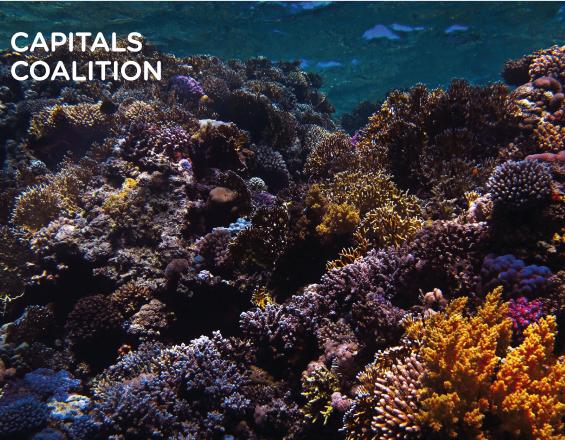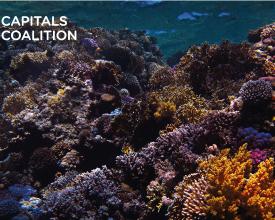
Intégrer la valeur du capital naturel, social et humain des océans dans le processus décisionnel des entreprises

Les entreprises jouent un rôle clé dans la gestion intelligente des océans. Cependant, la plupart d'entre elles ne comprennent pas pleinement comment leurs activités ou leurs chaînes de valeur sont liées à l'océan en termes d'impact et de dépendance. Par conséquent, les entreprises ne reconnaissent pas la valeur de l'intégration de l'océan dans les décisions commerciales fondamentales.
L'approche des capitaux permet aux organisations de comprendre comment leur succès est directement - ou indirectement - soutenu par le capital naturel (ressources naturelles renouvelables et non renouvelables produisant un flux de bénéfices pour les personnes), le capital social (réseaux et normes partagées, valeurs et compréhension qui facilitent la coopération au sein des groupes et entre eux) et le capital humain (connaissances, aptitudes, compétences et attributs des individus contribuant à l'amélioration des performances et du bien-être).
En identifiant, en mesurant et en évaluant les impacts et les dépendances sur le capital océanique, l'approche par les capitaux permet aux entreprises de prendre des décisions qui offrent la plus grande valeur possible pour tous les capitaux.
Contexte
Défis à relever
Une approche fondée sur les capitaux permet de remédier au manque général de compréhension de l'impact et des dépendances des entreprises basées sur les océans à l'égard d'un océan en bonne santé, ainsi qu'à l'intégration limitée des valeurs du capital océanique dans les décisions commerciales de base.
Emplacement
Traiter
Résumé du processus
Les éléments constitutifs ne représentent que quelques changements qui pourraient être réalisés grâce à l'intégration des capitaux dans la prise de décision, mais cette approche peut être utilisée pour beaucoup d'autres. L'idée d'inclure ces applications réelles est de démontrer la contribution tangible qu'une approche par les capitaux peut apporter à la prise de décision pour les gouvernements, les entreprises et la finance.
Blocs de construction
Une meilleure gestion de la biodiversité des océans et des services écosystémiques
Une approche fondée sur les capitaux peut éclairer la gestion de la pêche en complétant les mesures traditionnelles, telles que les rendements maximaux durables, par des paramètres plus complets.
Facteurs favorables
Il s'agit de l'un des quatre changements clés proposés pour la transition vers une économie bleue durable. L'application d'une approche fondée sur les capitaux à un tel cas permettra d'obtenir la base de données nécessaires pour inspirer l'action d'autres acteurs.
Leçon apprise
Ce travail n'est pas encore achevé
Davantage d'investissements dans les entreprises océaniques durables
Une approche fondée sur les capitaux peut compléter les mesures ESG pour fournir des informations solides et essentielles à la prise de décision des investisseurs, sur la base de tous les capitaux, tels que la traçabilité des produits de la mer.
Facteurs favorables
Il s'agit de l'un des quatre changements clés proposés pour la transition vers une économie bleue durable. L'application d'une approche fondée sur les capitaux à un tel cas permettra d'obtenir la base de données nécessaires pour inspirer l'action d'autres acteurs.
Leçon apprise
L'investissement durable dans les solutions bleues suscite beaucoup d'intérêt et une approche capitalistique peut aider à compléter l'ESG pour prendre les bonnes décisions en matière d'investissement.
Une plus grande contribution des entreprises basées sur les océans aux objectifs climatiques
En appliquant l'évaluation à la planification de l'espace marin, une approche fondée sur les capitaux peut aider à évaluer les compromis lors du développement de l'énergie en mer.
Facteurs favorables
Il s'agit de l'un des quatre changements clés proposés pour la transition vers une économie bleue durable. L'application d'une approche fondée sur les capitaux à un tel cas permettra d'obtenir la base de données nécessaires pour inspirer l'action d'autres acteurs.
Leçon apprise
Ce travail n'a pas encore été effectué
Garantir l'équité et la prospérité des communautés côtières
Une approche fondée sur les capitaux peut aider à comparer les options entre deux moyens de subsistance alternatifs pour les communautés côtières, y compris l'impact sur les personnes et la nature.
Facteurs favorables
Il s'agit de l'un des quatre changements clés proposés pour la transition vers une économie bleue durable. L'application d'une approche fondée sur les capitaux à un tel cas permettra d'obtenir la base de données nécessaires pour inspirer l'action d'autres acteurs.
Leçon apprise
Cette application n'a pas encore été compilée et fera progresser le domaine de l'évaluation du capital social et humain.
Impacts
- Fournir des informations solides et exploitables sur la valeur du capital naturel, social et humain des océans, que les entreprises peuvent utiliser pour prendre des décisions éclairées en vue d'une meilleure gestion des ressources.
- Accélérer la transition vers une économie bleue durable qui tienne compte de la valeur apportée par la nature et les personnes
- Permettre aux entreprises basées sur l'océan de reconnaître la valeur d'une économie positive pour la nature et socialement juste, à la fois dans l'intérêt de la société et de la durabilité de leur propre entreprise.
- Permettre des changements clés tels que la restauration de la biodiversité, le financement durable des océans et la définition d'objectifs climatiques en recueillant des données solides et exploitables qui tiennent compte de l'ensemble du système.
- En mettant en évidence les liens entre plusieurs secteurs et tout au long des chaînes de valeur, il permet de mieux comprendre les connexions et les compromis entre les services écosystémiques, les moyens de subsistance de l'homme, les réseaux sociaux et les flux de ressources monétaires et non monétaires.
Bénéficiaires
- Les entreprises basées sur l'océan qui cherchent à comprendre et à gérer leurs impacts et leurs dépendances vis-à-vis de l'océan
- La société dont les moyens de subsistance dépendent d'un océan en bonne santé
- Les décideurs politiques qui s'intéressent au rôle des entreprises dans la planification de l'espace marin.
Objectifs de développement durable
Histoire

L'approche des capitaux permet d'éclairer les décisions opérationnelles et stratégiques tout au long de la chaîne de valeur.
BNP Paribas Asset Management (BNPP AM) a été l'un des premiers à adopter l'approche capitalistique. Cette institution financière au portefeuille large et varié cherche à réduire l'impact de ses investissements sur le capital naturel.
Aujourd'hui, cependant, le manque de données rend la mesure des impacts et des dépendances sur le capital naturel de plus en plus difficile. BNPP AM tente de combler ces lacunes en améliorant l'analyse sectorielle de l'environnement, du social et de la gouvernance (ESG) des entreprises afin de cartographier les "points chauds", de sensibiliser et finalement d'intégrer la valeur du capital naturel dans les décisions d'investissement.
À l'aide du Natural Capital Protocol, BNPP AM a réalisé une évaluation qualitative portant sur deux questions essentielles ayant un impact sur la durabilité des océans : 1) l'approvisionnement en produits de la mer et 2) les stratégies en matière de plastique et d'emballage. L'évaluation a commencé par l'analyse de chaque entreprise à l'aide d'une série d'indicateurs. Ils ont examiné dans quelle mesure les entreprises fixaient et atteignaient leurs objectifs, dans quelle mesure elles s'impliquaient dans l'engagement des parties prenantes, dans leur gestion des risques liés à la transparence, dans la protection de la biodiversité et dans leurs performances. Sur la base de cet examen qualitatif, ils ont attribué une catégorie positive, neutre ou négative à chaque critère. Un bonus/malus allant de -30% à +30% a été appliqué au score ESG de l'entreprise et a conduit à plusieurs changements dans les recommandations ESG, à la fois vers le haut (par exemple, une entreprise passant de neutre à positif) et vers le bas (par exemple, une entreprise passant de neutre à négatif).
Les notes ESG de BNPP AM ont été communiquées à tous les gestionnaires de portefeuille et sont désormais appliquées de la manière suivante :
- Pour les fonds d'investissement socialement responsable (ISR) les plus performants, les gestionnaires de portefeuille ne peuvent pas investir dans les trois derniers déciles ESG.
- Pour les fonds non ISR, les gestionnaires de portefeuille suivent une approche "d'intégration ESG", dans laquelle l'analyse ESG est intégrée à différents stades du processus d'investissement, l'objectif étant que tous les fonds présentent des caractéristiques ESG plus favorables (par exemple, un score ESG plus élevé et une empreinte carbone plus faible) que leur indice de référence.
Ce classement leur a permis d'informer leurs clients sur les bons et les mauvais investissements. L'inclusion de la valeur liée au capital naturel dans les scores ESG a donc amélioré leur prise de décision, ce qui a permis d'obtenir des résultats plus positifs pour l'économie océanique.


